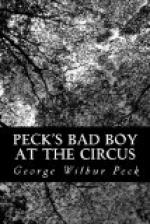There are all classes among the animals in a menagerie the same as human society. The lions are like the leaders of society who are well born and proud but poor. They are always invited everywhere, but never entertain, though they kick and find fault and ogle everybody and look wise and distinguished.
The sacred cattle are too good to live and pose as the pious animals who do not want to associate with the bad animals and are constantly wearing an air of “I am holier than any of you,” but they will reach through the bars of their cage and steal alfalfa from the Yak and the mule deer, and if they kick about it the sacred cattle look hurt and act like it was part of their duty to take up a collection, and they bellow a sort of hymn to drown the kicking.
The different kind of goats in a menagerie are the butters-in, or the new rich, who get in the way of the society leaders and try to outdo them in society stunts, but they smell so that the other animals are made sick and the goats are only tolerated because animal society is afraid to offend them, for fear the leaders may some time go into bankruptcy and the goats will take their places and never let them get a smell of the good things of life.
The bears are the working people of the show, and the big grizzlies are the walking delegates who control the amalgamated association of working bears, and the occupants of the other cages have got to cater to Uncle Ephraim, the walking delegate, or be placed on the unfair list and slugged.
The hyenas and the jackals and the wolves represent the anarchists who are down on everybody in the show, who won’t do a thing to help along and won’t allow any other animal to do anything, and who seem to want to burn and slay, to carry a torch by night and poison by day, and want everything in the show to be chaos. Those animals are never so happy as when the wind and lightning strike the tent, and blow it down and kill people and create a panic, and then these anarchists sing and laugh and enjoy their peculiar kind of animal religion.
The zebras and giraffes are the dudes of the show, and you can imagine, if they were human, they would play tennis and golf, drive four in hands and pose to be admired, while the Royal Bengal tigers, if they were half human, would drive automobiles at the rate of a mile a minute on crowded streets, run over people and never stop to help the wounded, but skip away with a sneer, as much as to say: “What are you going to do about it?”




